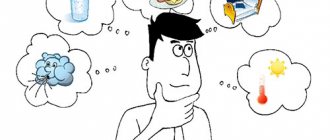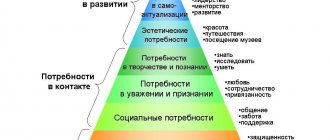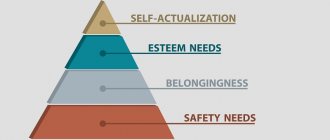Needs determine the life of mankind. Moreover, if they are not satisfied, people show impatience, and if they are fulfilled completely, they will become indifferent. More than 50 years ago, the authoritative American psychologist Abraham Maslow was able to structure our desires and needs into a general picture - a pyramid of human needs, which consists of 7 levels; there are more than enough examples of effective practical application of the theory in business and personal interests. She is admired and criticized at the same time. To learn how to use it, you need to understand the structure and patterns of its creation.
Maslow's theory - in brief
The researcher’s goal was the main incentives and motivators, understanding what is the main driving force and call to action. He expressed the idea that each of us has conditions for a comfortable life, we strive for them and achieve them. Something is more important for us, something is significant, but not paramount. Based on this conclusion, the psychologist built a hierarchy of necessary requirements. It includes physiological needs, safety, the desire to love and be loved, respect, status and self-actualization.
If basic aspirations are not satisfied, it is difficult for people to think about higher matters. When your salary is not enough for daily expenses, you work your butt off and don’t sleep at night to pay off your mortgage, you have no time to think about self-development, and you are unlikely to want to.
Application in marketing
In marketing, Maslow's pyramid serves as a starting point for finding target audiences and segmenting them, as well as for market analysis. Based on data received from users, specialists can find out what needs prevail among the target audience.
For example, the user cannot place an order for a long time - perhaps there are some fears - and the specialist needs to be told about the guarantees. Or show the valuable qualities of a product that will help improve its comfort: cooking equipment, an alarm system to protect the home, a Parker pen as an indicator of a person’s success and wealth.
Important! The pyramid is a material for reflection that will help you understand the big picture, but not solve a specific problem.
Thanks to the concept, it is possible to plan long-term goals in order to track the dynamics of changes in the needs of the audience and see their path of interaction with the brand. That is, the company can predict demand, develop a strategy and assess risks. And for each segment, develop a unique offer and a corresponding product.
For example, a consumer is looking for a vacuum cleaner. It follows the classic customer journey:
- The first stage: “Manifestation of need.” It compares the characteristics and cost of the product.
- The second and third are “Interest” and “Research”. After the buyer has become familiar with the brand, he studies the warranty terms and delivery information.
- The fourth is “Purchase”. Purchase of goods.
- Fifth - “Return” or “Manifestation of need”. After the purchase, a person may discover a defect or breakdown - and either the company will solve this problem, or he will continue to search. At all stages, the buyer experiences different needs.
Authorship
Maslow outlined his thoughts in his treatise “Motivation and Personality,” published in 1954.
It is important that, in his opinion, the order of provision of necessary goods may vary from person to person, which is why he did not draw a diagram or present his concept in the form of a diagram. This was done by his students and followers. According to some sources, the author is F. Kotler, the writer of the handbook for marketers “Fundamentals of Marketing”; according to others, it is W. Stopp, who, five years after the author’s death, published a hierarchy of desires in his articles.
Table
At the heart of Maslow's pyramid are the basic human instincts, which psychology considered to be extremely important needs for a satisfactory standard of living. Surprisingly, the impulses of the soul were not taken into account until the mid-20th century, when an innovative psychologist started talking about them.
| Level | Definition | Brief explanation |
| Physiological | It unites what is naturally connected with human life and sociality. |
|
| Safety | The need to feel security and comfort for yourself and your loved ones. |
|
| Social | Includes communication, affection, family creation, joint activities. |
|
| Prestige and reputation | Reminds you of the desire to be needed and important, to respect yourself and receive recognition from society. |
|
| Cognitive (creative) | Expresses a desire for new knowledge, expansion of erudition and development of intelligence. |
|
| Aesthetic | Helps to achieve harmony and joy through beauty and art. |
|
| Spiritual | The highest level of needs for the harmonious development of personality. |
|
Psychologist Daria Milai
Make an appointment
Maslow's principles characterizing human nature
In his theories, Maslow outlined his understanding of how human behavior mechanisms function. Maslow studied motivation and put forward the opinion that it is characteristic of a person in any state; it can change, but remains the engine of human activity.
Free online intensive
Your Path to IT starts here
More details
Thus, while studying motivation, Maslow put forward the following basic principles:
- A person cannot fully satisfy his needs.
- An unsatisfied need motivates a person to act or satisfy this need.
- It follows from this that the motivator is not the needs themselves, but the level of their satisfaction.
- People's needs can be divided into several levels within a hierarchy.
- The needs of a new level disturb a person only after the needs of the current one have been satisfied.
- Basic or biological needs are inherent in a person from the very beginning, which is revealed by their name.
- Higher needs - spiritual, aesthetic and the need for self-realization - are not the same for all people. They are influenced by a person’s personality, how it was formed, and the conditions in which he finds himself.
Maslow's pyramid of human needs
The approach associated with the assumption that people need to satisfy not only physiological needs, but also want to develop spiritually and be recognized, became revolutionary in the 40s of the last century. The scientist created a structure in which he highlighted:
- congenital (stages 1 and 2);
- acquired (starting from the second and above).
Further, he divided them into types:
- lower ones (it is necessary to satisfy them, otherwise we will not survive);
- higher ones, it is not so easy to satisfy them.
According to the theory, only 2% of people make it to the top of the pyramid. Its levels look like this:
- Physiology.
- Safety.
- Love and desire to be accepted.
- Respect.
- Cognition.
- Aesthetics (craving for beauty).
- Unlocking personal spiritual potential (self-actualization).
After Maslow’s death, his brainchild began to be used in marketing; it still attracts the attention of theorists and practitioners of psychology and business, causing a lot of controversy and adjustments. Modern approaches include, for example, models for a post-industrial society.
Physiological
Like any other living organism, for normal development, growth and existence, a person requires water, food, and air. He should be able to sleep, recuperate and go to the toilet. As a species, we continue our race and are influenced by hormonal surges.
While your stomach is growling from hunger, and your eyes are drooping from sleepless nights, you won’t be able to concentrate on work, creativity or reading. Maslow includes health, food, sleep, water and other innate needs as the first stage.
Face-to-face consultation
What are the features and advantages of face-to-face consultation?
Find out more
Skype consultation
What are the features and benefits of Skype consultations?
Find out more
Safety
It comes to the fore after providing physiological needs. This concept is multifaceted. It includes:
- physical protection from violence, attacks, wars, natural disasters;
- social stability and confidence in the future, which is determined by the presence of education, good work, pension;
- inviolability of private property, protection and insurance of one’s property;
- freedom from fear, confusion and confusion;
- law and order, clear rules and framework.
A person is designed in such a way that he prefers the known to the unknown, therefore he strives to obtain information and sees this as a guarantee of his security. And everything new takes root in society with difficulty. It’s not for nothing that we often use the expression: “Stability is an indicator of class.” We want to protect ourselves and our loved ones and continue to rise to the top of the pyramid.
Love/Belonging to something
At the new turn of the motivational spiral, love and friendship relationships become relevant. Their shortage is acute and is the most important need.
The feeling of loneliness and rejection torments, causing suffering. We strive to find a kindred spirit, a family in which we will be accepted and loved, like-minded people and friends.
Maslow identified deficiency love, which is addressed to others with the goal of getting something in return: sex, respect, a companion and being love, which is aimed at the inner world, interests and life of another person. She knows how to accept everything as it is, does not try to intervene and change, does not strive to possess the object of passion. So, having grown flowers and admiring their beauty, under the influence of existential love, you will leave them in the flowerbed, and succumbing to scarcity, you will cut them for a bouquet.
Respect
This is all connected with the desire to gain recognition and take an authoritative position in society. The desire for prestige involves people in the struggle for promotion at work, and encourages them to take up dancing, music, and fencing. It craves growth in self-esteem.
When others evaluate and approve of your actions and achievements, you become confident in yourself, get the opportunity to open up and use all your talents.
Cognition
The description of Maslow's 7-level pyramid does not end with this step, although in some versions it is the top. Exploring the world, searching for new paths and opportunities is one of the most powerful incentives for development and the desire to survive. The only way to overcome your anxiety about the future is to begin to control your destiny. Only then will fears turn into new opportunities, and ethereal experiences into real adventures.
I will help you overcome uncertainty and panic, just sign up for a personal consultation with me. As we learn, we are surprised and happy, because from early childhood we strive to learn something new.
Aesthetic
The value of beauty is that it can not only be seen, but also created. People are capable of decorating the world around them, making it brighter, more individual and more emotional. The desire to change the environment does not come to everyone, although we are all given the ability to see beauty.
No one is left indifferent by works of painting and architecture, music and literature.
Self-actualization
In simple words, the seventh stage is the happiness of being yourself. Maslow was sure that every person has his own path and cannot turn away from it. Then everyone will go about their activities and live in harmony with their inner world. Unlocking your potential is a lifelong endeavor. The paths to a favorite activity are varied, so it is at the high level of the pyramid that people’s motives are especially unique. Only a few reach the top, although everyone has the ability for self-realization. The researcher explained the reason for this phenomenon as follows:
- People do not know their capabilities, do not understand the benefits of self-development and doubt their own abilities.
- Society crushes us with its stereotypes and prevents us from realizing our talents.
- Fear of danger, taking actions that do not guarantee success.
Controversial points regarding the structure of the pyramid
At first glance, everything seems quite logical, but this is not entirely true. Its creator himself said that needs can change places, depending on the specific person. After all, many of us have met people who completely devoted themselves to building a successful career, forgetting about family and love.
Complete closure of the previous stage does not always guarantee transition to the next one and vice versa. For example, great creators very often lived in poverty and hunger, but did not give up their favorite pastime. Maslow himself explains such examples by the fact that such people had their previous needs as closed as possible in childhood, so they were able to sacrifice them in adulthood.
In addition, a fall down is possible if some of the needs located there were not fully satisfied earlier. Putting the sexual instinct in first place causes heated debate. Examples of holy people prove exactly the opposite.
Studying the pyramid is quite an interesting process, but you shouldn’t take it as a basis, because every person is unique.
Violated needs
At each of the 7 steps of Maslow's pyramid, dissatisfaction can occur. It leads to diseases, disturbances in psycho-emotional balance, various disorders and ailments. Both mental and physiological factors are closely interrelated and complement each other. A person feels more cheerful, energetic and healthy when most of his aspirations are achieved.
Ask a question
Description of the pyramid
Maslow's pyramid is a small model of human needs ranked by level of importance. It was developed by psychologist Abraham Maslow, who lived and practiced in America. In addition, he published several books in which the author’s ideas were fully revealed.
According to Maslow, one cannot assume that a person strives to satisfy exclusively physiological needs, as psychologists said earlier. There is a certain hierarchy in the nature of human needs. After the natural, physiologically determined needs, come the needs of the highest type, which directly influence the actions and thoughts of each person.
What is the meaning of Maslow's pyramid
The theory has found application not only in pedagogy and psychology, but also in marketing and management. There is something different for each direction:
- It contains a call to action for the majority of people. Did you eat, sleep, run? It's time to start self-development! There is no irony or sarcasm in this; rather, it is a hint and a vector of movement.
- Helps to identify real needs and not pay attention to those that have already been satisfied.
- Gives the right direction of knowledge - from simple to complex.
- Argues that there is room in life for different value systems, priorities and incentives. There is no universal action plan.
The importance of the theory of needs for personality
However, Maslow's theories can be successfully applied in life.
It allows a person:
- understand yourself, find out unconscious needs, understand the degree of dissatisfaction with something (for example, the method of constellations is aimed at this);
- set priorities and organize life in accordance with them;
- choose the desired and appropriate direction of activity (cognitive, social, professional);
- understand the desires of loved ones (spouse, child), guide them in the right direction (in raising children).
A satisfied need ceases to motivate
We are talking about the degree of topicality, the timeliness of the realization of a particular desire. A sense of security does not push for even greater self-defense, recognition does not require further efforts to assert oneself, a large number of strong social connections does not lead to their endless creation and strengthening. When we achieve something, we need to go forward and look for what we did not manage to satisfy.
Theory and practice
When using a pyramid, remember its conventions. Otherwise, the generalizations and conclusions you make may turn out to be wrong.
The sample used to build the model included people who were “ideal” or close to this concept. Maslow himself spent a long time and diligently selecting such respondents. Therefore, the results turned out to be “standard”.
Using the scheme to build a management motivation system will take the company to a new level without major investments. Each employee must receive stable pay in order to live and feel safe; participate in team activities to socialize and gain recognition and respect; have the opportunity to perform complex and responsible work within their competencies in order to develop and update themselves.
Criticism
The main arguments of supporters of the anti-Maslow movement are:
- The hierarchical ladder of priority does not correspond to reality.
- All aspirations can never be satisfied.
- It has not been confirmed experimentally.
Ed Dinner did a great job analyzing the famous model in 155 countries from 2005 to 2010. He came to the conclusion that the order in which needs are satisfied does not matter, and the provision of the listed benefits is associated with a feeling of happiness. Therefore, in general, Maslow's theory is correct.
Advantages and disadvantages
Pros of the model:
- convenient for self-analysis, provides an excellent opportunity to sort out your thoughts, structure your goals, and determine the point at which you are;
- will help you set life’s accents and priorities;
- will push you to choose a direction of activity;
- will teach you to better understand other people.
Minuses:
- is a theoretical approach without applied techniques;
- provides universal material from which there are always exceptions;
- is not considered the only correct concept of the pyramid of goals and needs.
Application in life
As we said above, theory helps you understand yourself - thoughts, desires, values and fears. By analyzing events or actions, you can understand what need needs to be satisfied and what factors prevent this from being done.
A person is also able to analyze other people and understand how to interact with them. This could be supporting a friend or partner in difficult times, observing ethics in business communication, or expressing gratitude to a salesperson in a store.











